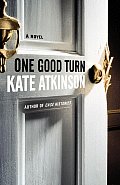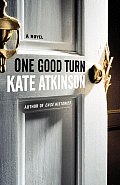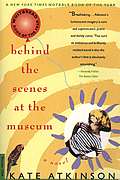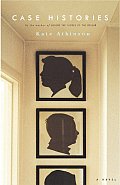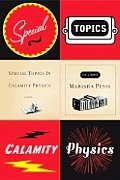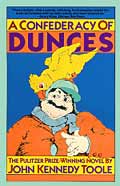 Right now I'm reading The Code of the Woosters, by P.G. Wodehouse. It's about a slightly dim, upper crusty British guy, Bertie, and his resourceful manservant, Jeeves. I love all the Jeeves and Wooster books that I've read. They're really funny (or, as Wodehouse might write, "rather spiffy") and the language is terrific. I've been laughing out loud while reading on the train, and I often find the urge to explain, "See, he just said, 'mens sana in corpore whatnot.'" This particular book, so far, focuses on a "cow creamer" and various romantic liaisons, which Bertie always seeks to avoid. Another line that made me laugh was the following, in which a friend of Bertie's explains a scheme:
Right now I'm reading The Code of the Woosters, by P.G. Wodehouse. It's about a slightly dim, upper crusty British guy, Bertie, and his resourceful manservant, Jeeves. I love all the Jeeves and Wooster books that I've read. They're really funny (or, as Wodehouse might write, "rather spiffy") and the language is terrific. I've been laughing out loud while reading on the train, and I often find the urge to explain, "See, he just said, 'mens sana in corpore whatnot.'" This particular book, so far, focuses on a "cow creamer" and various romantic liaisons, which Bertie always seeks to avoid. Another line that made me laugh was the following, in which a friend of Bertie's explains a scheme:"There was a story...about a duke who wouldn't let his daughter marry the young secretary, so the secretary got a friend of his to take the duke out on the lake and upset the boat, and then he dived in and saved the duke, and the duke said, 'Right ho.'"
 Also everyone has really hilarious nicknames, like Stinker and Gussie and Stiffy. I've been trying to get my friends to call me by a nickname for years - I suggest something like Muffy or Kitty - but so far... nothing. BTW, the BBC series, Jeeves and Wooster, is quite good, although not as good as the books, and features another of my favorite authors, Stephen Fry, as Jeeves. His autobiography, Moab is My Washpot, is nothing less than superb.
Also everyone has really hilarious nicknames, like Stinker and Gussie and Stiffy. I've been trying to get my friends to call me by a nickname for years - I suggest something like Muffy or Kitty - but so far... nothing. BTW, the BBC series, Jeeves and Wooster, is quite good, although not as good as the books, and features another of my favorite authors, Stephen Fry, as Jeeves. His autobiography, Moab is My Washpot, is nothing less than superb. 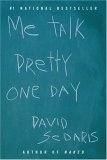 The Code of the Woosters really should be read aloud - or at least that's what I wish to do with it - although a certain husband abhors the idea of being read to. It was a real problem when I read Me Talk Pretty One Day and kept saying, "Oh my god, listen to THIS!" I have only on one (ONE!) occasion gotten him to read to me: a little Harry Potter when I was so sick I thought I was dying. Ah, how I cherish the memory.
The Code of the Woosters really should be read aloud - or at least that's what I wish to do with it - although a certain husband abhors the idea of being read to. It was a real problem when I read Me Talk Pretty One Day and kept saying, "Oh my god, listen to THIS!" I have only on one (ONE!) occasion gotten him to read to me: a little Harry Potter when I was so sick I thought I was dying. Ah, how I cherish the memory. 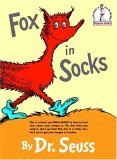 Me dear ol da used to read to me and my brother and sister when we were kids. Mostly Dr. Seuss, and he was very good at it. In my adult life I am read to very little, although once my friend Liz read J.D. Salinger to me on a car trip from San Francisco to LA. Occasionally I'll pick up a book on tape and listen to it before I go to bed. I listened to quite a few of The No. 1 Ladies' Detective Agency series in this way. They are read by Adjoa Andoh - she has a beautiful African accent that lulls me. Oh, Jesus Christ. I just googled her, and it turns out she's British, and that's not her real voice. Her voice over page describes her voice as "Authoritative, maternal, warm, smooth." Wow. If someone described my voice, it'd probably be "Unsure, brassy, annoying, stiff."
Me dear ol da used to read to me and my brother and sister when we were kids. Mostly Dr. Seuss, and he was very good at it. In my adult life I am read to very little, although once my friend Liz read J.D. Salinger to me on a car trip from San Francisco to LA. Occasionally I'll pick up a book on tape and listen to it before I go to bed. I listened to quite a few of The No. 1 Ladies' Detective Agency series in this way. They are read by Adjoa Andoh - she has a beautiful African accent that lulls me. Oh, Jesus Christ. I just googled her, and it turns out she's British, and that's not her real voice. Her voice over page describes her voice as "Authoritative, maternal, warm, smooth." Wow. If someone described my voice, it'd probably be "Unsure, brassy, annoying, stiff." Well, I hope you have some nice stories to tell re: reading/being read to. Please leave a note in the comments if you'd like to share.

